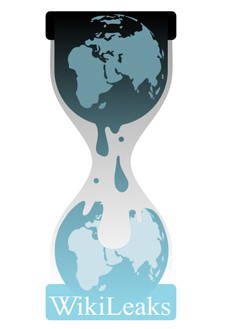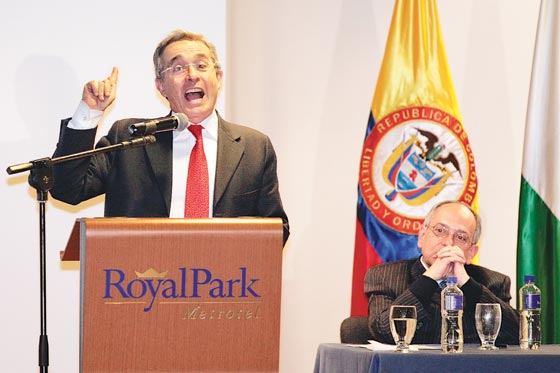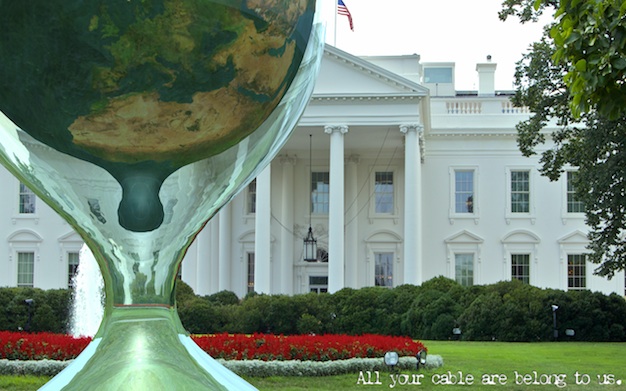

For in-depth coverage of the arraignment, see Alexa O'Brien's transcript and Kevin Gosztola's live-blog.
(Links for further coverage available at the end of this update.)

This is a "WikiLeaks News Update", a daily news update of stories relating directly to WikiLeaks and also freedom of information, transparency, cybersecurity, and freedom of expression.
News

This is a "WikiLeaks News Update", a daily news update of stories relating directly to WikiLeaks and also freedom of information, transparency, cybersecurity, and freedom of expression.
News
Over the past few years, the international left has derived much satisfaction from the course of South American political and economic integration. The novelty of such integration is that it has proceeded along progressive lines and has been pushed by regional leaders associated with the so-called "Pink Tide." With so many leftist leaders in power, it is plausible to surmise that a left bloc of countries might challenge Washington's long-term hemispheric agenda. Yet, behind all of the lofty rhetoric and idealism, serious fissures remain within South America's leftist movement, both within individual countries and within the larger regional milieu.
That, at least, is the impression I got from reading U.S. State Department cables recently declassified by whistle-blowing outfit WikiLeaks. Take, for example, the Luiz Inácio "Lula" da Silva administration in Brazil, which at times encouraged a "hostile" climate against the Free Trade Area of the Americas or FTAA, a corporately-sponsored plan backed by Washington, while on other occasions encouraging "public doubt and confusion through its own often-conflicting statements" about the accord. Behind the scenes, the Brazilian government was much more divided on the matter than commonly portrayed, torn between its South American loyalties on the one hand and the desire to gain access to the lucrative U.S. market for agricultural and industrial goods on the other.
With a big question mark hanging over the health of Venezuelan president Hugo Chávez, many in Washington may see opportunity. Though Chávez initially claimed that he was merely suffering from a "pelvic abscess," the firebrand leader subsequently conceded that he had cancer. In a shock to the nation, Chávez announced that he had a tumor removed during a sojourn in Cuba, and that he would "continue battling."
Reporting over the past several weeks suggests that Chávez might be in worse shape than has been commonly let on. Though he returned to Venezuela after his operation in Cuba, Chávez recently announced that he would pay yet another visit to Cuba in order to undergo chemotherapy. The firebrand leader, however, still refuses to reveal what kind of cancer he has or its severity. Ominously, one medical source reported to Reuters that Chávez's cancer had spread to the rest of his body and was in an advanced stage.
It's unclear how the president's shaky health might factor in the nation's upcoming 2012 election. The populist leader, who has closely identified himself with the so-called "Bolivarian Revolution," has never shown much interest in grooming a successor within his own United Socialist Party of Venezuela or PSUV, and so if Chávez should falter it is easy to imagine a scenario in which much of his political project could unravel or be derailed by the right.
The Caracas Cables
Judging from U.S. State Department cables recently declassified by whistle-blowing outfit WikiLeaks, many American diplomats, including former ambassador in Caracas Charles Shapiro, would view this outcome as highly desirable. In 2004, two years after the Bush administration aided the rightist opposition in its short-lived coup attempt against Chávez, Shapiro sat down with Alí Rodríguez, the head of Venezuela's state-run oil company

This is a "WikiLeaks News Update", a daily news update of stories that are obviously related to WikiLeaks and also freedom of information, transparency, cybersecurity, and freedom of expression. All the times are GMT.
04:40 PM A top-secret document obtained by The Guardian reveals information was extracted through illegal torture of prisoners overseas by the MI5 and MI6 with authorization from Tony Blair's government.
The allegations echo evidence of torture by Iraqi forces that had been exposed by WikiLeaks last year. (via thinq_)
12:40 AM A ‘Conversation with Mark Stephens’, Julian Assange’s former lawyer, is to take place in Glasgow, on the 1st September. Topics will include the law surrounding freedom of information and the European arrest warrant, and possibly ‘the increasing prevalence of denial of service attacks’. For more details: An Interview with Mark Stephens at Strathclyde university
06:00 AM Legislation that could keep Guantanamo open indefinitely will be voted on by the U.S. Senate in early September. This legislation has already been passed by the House of Representatives.
To prevent this from happening, please call your two Senators and and urge them to take a stand against Guantanamo!
To do this you can either
* call the Congressional switchboard at (202) 224-3121 and ask for your Senators
 Antiwar and international solidarity activists, subjects of a federal grand jury investigation that alleges they may have provided “material support for terrorism,” uncovered documents on FBI guidelines and investigation practices left behind in an activist’s home that was raided in September of last year. The documents illuminate how the FBI has conducted surveillance of the activists being targeted in the investigation and further prove the grand jury is being used as a tool to go after political groups.
Antiwar and international solidarity activists, subjects of a federal grand jury investigation that alleges they may have provided “material support for terrorism,” uncovered documents on FBI guidelines and investigation practices left behind in an activist’s home that was raided in September of last year. The documents illuminate how the FBI has conducted surveillance of the activists being targeted in the investigation and further prove the grand jury is being used as a tool to go after political groups.
On September 24 of last year, the home of Lindon Gawboy and Mick Kelly, an activist who helped to organize a mass demonstration outside the Republican National Convention in 2008, was raided and subpoenaed. Gawboy was awoken by FBI pounding on her door. She came to the door and asked for a search warrant. The FBI ignored her request for a warrant and proceeded to use a battering ram, which took the door off its hinges and shattered a nearby fish tank.
The agents raiding Gawboy and Kelly’s home emptied file cabinets and desks and stacked files around the apartments. They set up and went through individual documents taking files away that were of interest to them. At some point during this process, an agent’s papers on the investigation became mixed in with Kelly’s files. And, presumably by chance, Gawboy found the revealed documents just weeks ago.
Authored by Juan Gabriel Gomez Albarello, Instituto de Estudios Políticos y Relaciones Internacionales, Universidad Nacional de Colombia. This article is available in Spanish in El Espectador.
The so-called “Lleras Act”, a proposal concerning intellectual property rights and access to internet in Colombia, prompts a discussion that has taken place in other places and which has led to various responses. I would not like to take the Colombian Constitutional Court's place and claim that, if Congress approves the current proposal, that tribunal would declare the Act inconstitutional. However, I would like to refer to the way in which the problem of granting adequate protection of basic rights such as the presumption of innocence and the freedom of expression was approached by the French Constitutional Council.
The proposal submitted to Congress by the Interior Minister, German Vargas Lleras (grandson of a former Colombian president, Carlos Lleras), proposes to protect intellectual property rights by means of restricting access to internet to those accused of infringing upon those rights. From the cultural industry's point of view, the most interested part in the profits that those rights generate, the protection mechanism included in the proposal is very ingenious: the individual or firm who feels affected by a violation of their intellectual property rights can complain before the user's internet provider and request a suspension of that user. If the provider refuses to do so, then such a provider would share the responsibility related to any violation of their rights.
 Update: The edited podcast is posted along with a full transcript of Edward Fox of ColombiaReports.com's interview.
Update: The edited podcast is posted along with a full transcript of Edward Fox of ColombiaReports.com's interview.
The guest for this episode of "This Week in WikiLeaks" was Edward Fox, who is with Colombia Reports. He has been editing and organizing releases of the US State Embassy cables that deal with Colombia. On the show, we will talk about how the cables are impacting Colombia, what has been revealed and discuss some specific revelations concerning FARC, the US-based Drummond Coal corporation, the DAS wiretap scandal and, finally, the revelation that the US has been using drones in Colombia since 2006.
Following the interview with Fox, the show wrapped with a brief look at the cables from Israel that are being released and what they are revealing. WL Central has covered what they show about Israeli officials’ views on Hamas in Gaza. There is much more to hone in on, as another aspect of the cables that deserves attention is fear and trepidation on Iran. The cables also appear to affirm some aspects of Al Jazeera English’s “Palestine Papers,” which gave the impression that the Palestinian Authority can be very deferential toward Israel and often take action that pretty much betrays the people of Palestine’s interests or well-being.
Here's a widget you can click play on to listen to the episode:
Or, you can go to this page and click on episode on Colombia that appears in the CMN News list (it is likely the most recent one). Or, you can search for the episode on iTunes. Search for "CMN News" and it will appear to download.
The Department of Administrative Security (DAS) of Colombia was used as a tool for domestic spying on various occasions during the Government of Alvaro Uribe (2002-2010). For example, #09BOGOTA849 states that, “CTI investigators reportedly found evidence that since 2004, the DAS had a unit dedicated to spying on groups and individuals considered a threat to the GOC. Originally known as the "G-3" group, the unit did not officially exist and reported only to the DAS director or the deputies in charge of intelligence and counterintelligence. "Semana" reported that besides numerous leftist groups and politicians, the G-3 also collected information on Supreme and Constitutional Court magistrates, Colombian Army officials, and their relatives. The unit was disbanded in late 2005 after a similar domestic spying scandal, but the article claims DAS continued domestic spying through the "National and International Group for Observation and Verification" (GONI) set up in 2006.”
The biggest scandal came in 2009 after weekly publication Semana broke the news that DAS had spied on Supreme Court Auxiliary Magistrate Ivan Velazquez and other leading magistrates that were working on a case investigating links between top level officials of GOC and paramilitary leaders. According to #09BOGOTA688, Semana stated that Velazquez “was followed by DAS detectives and may have had as many as 1900 of his calls illegally tapped over two years”. This quickly led to accusations by the Court that the Government of Colombia was trying to cover up its high level connections to right wing terrorist organizations. The Government denied its involvement in the scheme and was then placed under serious pressure to control DAS, to which Ex-President Uribe complied by placing them under the jurisdiction of the Colombian National Police (CNP) as well as by creating an investigative commission that vowed to identify the culprits.

 On March 12, 2001, in Colombia, then-president and vice president of Sintramienergetica, were both picked up by men of the the United Self-Defense Forces of Colombia (AUC), a terrorist paramilitary force in Colombia that has at this point been mostly dissolved. According to El Espectador, a Colombian newspaper (that has partnered with WikiLeaks), the trade unionist leaders were murdered in Locarno and transported in a van to Orcasita where they were found dead hours after being killed.
On March 12, 2001, in Colombia, then-president and vice president of Sintramienergetica, were both picked up by men of the the United Self-Defense Forces of Colombia (AUC), a terrorist paramilitary force in Colombia that has at this point been mostly dissolved. According to El Espectador, a Colombian newspaper (that has partnered with WikiLeaks), the trade unionist leaders were murdered in Locarno and transported in a van to Orcasita where they were found dead hours after being killed.
Sintramienergetica is a trade union that has workers that do labor for a US company based in Alabama, Drummond Coal. The history between the trade union and the coal giant has been tumultuous. Paramilitary leaders alleged to be responsible for the murders of the two trade unionists have gone on trial with Drummond being accused of handing over a suitcase of money to leader Rodrigo Tovar Pupo asking him to help “remove barriers” the union was creating for the company.

*Special thanks to C-Cyte for recording my tweets and posting them online in a post for people to view if they do not normally use Twitter.
One hundred days ago, WikiLeaks began to release the US State Embassy cables. The release event, which continues, became known as Cablegate.
A future post will include a look at Cablegate and what its impact on journalism, international diplomacy, and human rights has been and what its role has been in world events like the uprisings and revolutions the world that are currently unfolding. For now, it is worth recounting what has actually been revealed because of the release.
One common denominator can be found in a majority of the cables: corruption. For all the talk of this country and that country being corrupt and that country being so corrupt it's gone, the plain fact is that between all the countries of the world, perhaps as a result of American coercion and/or threat of force, the world is one corrupt planet.
WikiLeaks has managed to partner with 50 media outlets over the course of the past months. 5,287 of 251,287 cables have been released so far. This not only means there will likely be a 200th, 300th and 400th Day of Cablegate but also means there will be many more revelations to come in the next year.
Over the last decade, the Colombian government has tried hard to free itself from the bonds between government officials, congressmen and military leaders and right wing paramilitary United Self-Defense Forces of Colombia. The group is sponsored by a wide range of people: from high profile corporations and politicians to small landowners looking to protect their interests from opposite guerrilla formations such as FARC (Fuerzas Armadas Revolucionarias de Colombia) and ELN (Ejercito de Liberacion Nacional). Their actual political and economic power is a matter of concern and in the past even ex-President Alvaro Uribe has been questioned about his and his government’s involvement in illegal activities related to the organization. During these years violence has been widespread and thousands of people –civilians, businessmen and politicians have been killed or kidnapped.

 Aftenposten: READOUT NORTH ATLANTIC COUNCIL MEETING JANUARY 28, 2009
Aftenposten: READOUT NORTH ATLANTIC COUNCIL MEETING JANUARY 28, 2009
"AFGHANISTAN: ISAF Senior Civilian Representative Gentilini said the Afghans were eager for NATO to respond to its proposal for a military technical agreement, sent to NATO in early January. The SCR and several Perm Reps stressed that a MTA with the Afghans could help address the issue of civilian casualties, but many cautioned that the legal difficulties involved in negotiating such an agreement called for the Alliance to proceed with caution. Saying it needed more time to seek instructions, Hungary blocked consensus on a decision that fully filling the Elections Support Force (ESF) should take priority over filling the NATO Response Force (NRF), which would have allowed nations to pull NRF components for use in the ESF. The NAC will revisit the issue next week."
Aftenposten: AMBASSADORS JANUARY 11 MEETING WITH NATO SENIOR ISAF REPRESENTATIVE ON GIROA PROPOSED AFGHANISTAN-NATO MILITARY TECHNICAL AGREEMENT
The unprecedented US government effort to minimize fallout from an expected WikiLeaks release of diplomatic cables continues unabated. Countries to be warned now include India, Belgium and Colombia, in addition to the UK, France, Norway, Australia, Canada, Denmark, Italy, The Netherlands, Turkey, Afghanistan, Iceland, Russia, Sweden, Iraq, Israel and China.
The Independent: US envoys forced to apologise in advance as WikiLeaks release looms
"Frantic behind the scenes wrangling was under way last night as US officials tried to stem the fallout from the expected release of up to three million confidential diplomatic communiques by the WikiLeaks website.
Over the past 48 hours, American ambassadors have had the unenviable task of informing some of the country's strongest allies that a series of potentially embarrassing cables are likely to be released in the coming days."
Read more
International Business Times: Will WikiLeaks unravel the American 'secret government'?
"Researchers have often pointed out the stark contrast between nation states' declared policies -- and the means to achieve them -- and what actually transpires on the ground. The inner workings, the dark secrets and shady deals never see the light of day until they may be declassified years later, severely undermining democratic values of truth and transparency.
Now WikiLeaks is out to run a knife through a mountain of classified documents revealing how the proverbial 'secret government' works its way through cluttered diplomatic channels. And that certainly could be embarrassing to lots of people in many capitals, more so in Washington."
Read more
Frankfurter Rundschau: Wer hat Angst vor WikiLeaks?
"Who is afraid of WikiLeaks?" asks FR. "The U.S. is taking pains more than ever before to inform other interested governments. The world speculates about the upcoming revelations. The U.S. government wants to limit the possible diplomatic damage caused by the publication of secret documents from the State Department on the web. [...] Now half the world wonders who has to hide something."
Read more
The Daily Mail: U.S. warns Britain over new WikiLeaks revelations that will 'expose corruption between allies'
"David Cameron was warned last night by America that damaging secrets of the ‘special relationship’ are about to be laid bare.
The U.S. ambassador to London made an unprecedented personal visit to Downing Street to warn that whistleblower website WikiLeaks is about to publish secret assessments of what Washington really thinks of Britain."
Read more
Scotsman: WikiLeaks: The gathering storm - leaks leave US with few friends
"THE UK Government has been briefed by the American ambassador about the imminent release of highly embarrassing diplomatic files by the whistleblower website WikiLeaks with the potential to damage relations between the two countries.
Politicians and officials in the UK and US were last night on tenterhooks as they waited for the release of the documents, which are understood to contain American officials' candid assessments of governments that the US would rather keep secret including claims of alleged corruption in foreign administrations. [...] Last night there were claims that there could be a backlash from upset countries that would lead to the expulsion of US diplomats."
Read more
NDTV: US warns India about possible WikiLeaks release
"The US has warned India and other key governments across the world about a new potentially embarrassing release of classified documents by the whistle-blowing website WikiLeaks which may harm the American interests and create tension in its ties with its 'friends'.
"We have reached out to India to warn them about a possible release of documents," State Department Spokesman P J Crowley said."
Read more
SIPSE: EU 'se cura en salud' por filtraciones de WikiLeaks
"In Colombia, U.S. embassy spokeswoman Ana Duque-Higgins said the local government has been alerted.
'We have talked with government officials in Colombia about the release of some State Department documents that have been leaked and may appear in the press, and we are ensuring that they keep abreast of the situation as it develops,' she said."
Read more
Le Soir: WikiLeaks publiera ses documents dimanche soir
"The U.S. diplomatic post in Brussels alerted the Belgian authorities about a possible distribution by WikiLeaks of diplomatic cables that could potentially expose unknown aspects of Washington politics. "Like all other embassies in the world," councillor in charge of public diplomacy Tania Chomiak-Salvi told lesoir.be, "we expressed our concern to our Belgian counterparts about a possible spread by WikiLeaks of U.S. government communications."
Le Soir also notes that the WikiLeaks documents are likely to be published Sunday evening.
Read more
Theme by Danetsoft and Danang Probo Sayekti inspired by Maksimer